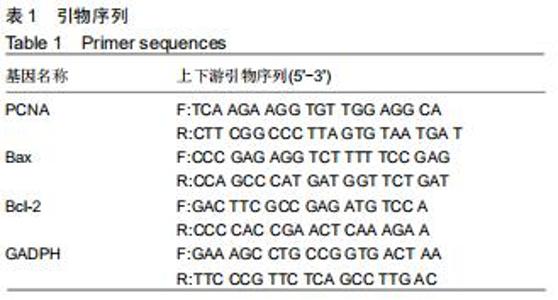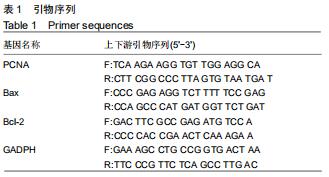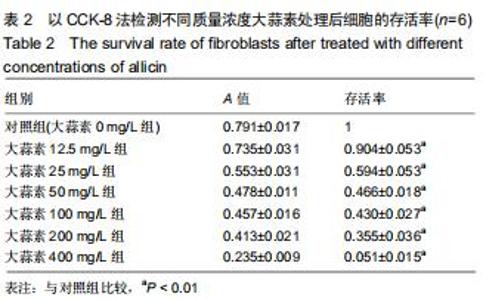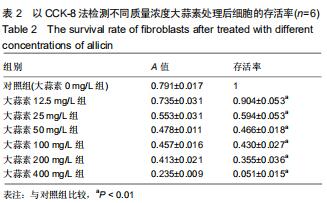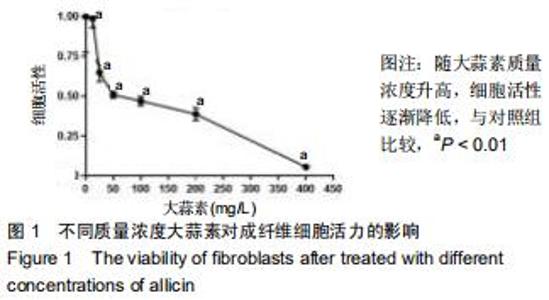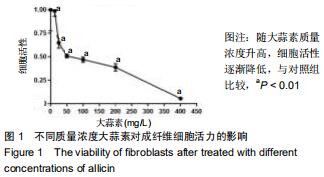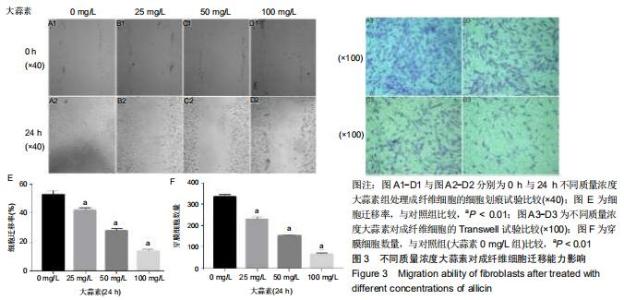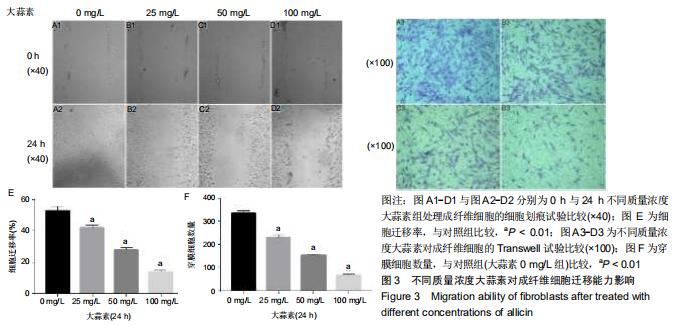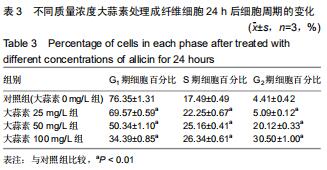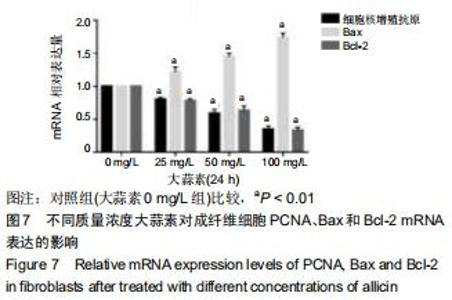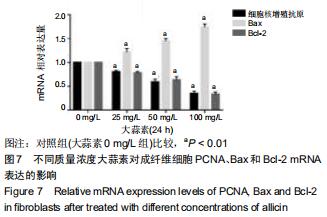Chinese Journal of Tissue Engineering Research ›› 2020, Vol. 24 ›› Issue (35): 5662-5667.doi: 10.3969/j.issn.2095-4344.2354
Previous Articles Next Articles
Mechanism by which allicin inhibits proliferation and migration but promotes apoptosis of human fibroblasts
Zhu Shoulei, Yang Jiandong, Cai Jun, Zhang Yujie, Tian Yuan
Department of Spine, Clinical Medical School of Yangzhou University, Northern Jiangsu People’s Hospital, Yangzhou 225001, Jiangsu Province, China
-
Received:2020-01-08Revised:2020-02-11Accepted:2020-03-04Online:2020-12-18Published:2020-10-17 -
Contact:Yang Jiandong, MD, Associate professor, Master’s supervisor, Department of Spine, Clinical Medical School of Yangzhou University, Northern Jiangsu People’s Hospital, Yangzhou 225001, Jiangsu Province, China -
About author:Zhu Shoulei, Master, Attending physician, Department of Spine, Clinical Medical School of Yangzhou University, Northern Jiangsu People’s Hospital, Yangzhou 225001, Jiangsu Province, China -
Supported by:Jiangsu Provincial Medical Innovation Team, No. CXTD2017004; the 13th Five-Year Leading Talent Project of Yangzhou Health Bureau, No. LJRC20182
CLC Number:
Cite this article
Zhu Shoulei, Yang Jiandong, Cai Jun, Zhang Yujie, Tian Yuan. Mechanism by which allicin inhibits proliferation and migration but promotes apoptosis of human fibroblasts[J]. Chinese Journal of Tissue Engineering Research, 2020, 24(35): 5662-5667.
share this article
|
[1] BABER Z, ERDEK MA. Failed back surgery syndrome: current perspectives. J Pain Res. 2016;9:979-987.
[2] WANG H, SUN W, FU D, et al. Update on biomaterials for prevention of epidural adhesion after lumbar laminectomy. J Orthop Translat. 2018;13:41-49.
[3] ZENG L, SUN Y, LI X, et al. 10Hydroxycamptothecin induces apoptosis in human fibroblasts by regulating miRNA23b3p expression. Mol Med Rep. 2019;19(4):2680-2686.
[4] FAN X, CHEN J, SHI D, et al. The role and mechanisms of action of SIRT6 in the suppression of postoperative epidural scar formation. Int J Mol Med. 2016;37(5):1337-1344.
[5] SU C, SUI T, ZHANG X, et al. Effect of topical application of mitomycin-C on wound healing in a postlaminectomy rat model: an experimental study. Eur J Pharmacol. 2012;674(1):7-12.
[6] BOSSCHER HA, HEAVNER JE. Incidence and severity of epidural fibrosis after back surgery: an endoscopic study. Pain Pract. 2010;10(1):18-24.
[7] PREUL MC, CAMPBELL PK, GARLICK DS, et al. Application of a new hydrogel dural sealant that reduces epidural adhesion formation: evaluation in a large animal laminectomy model. J Neurosurg Spine. 2010;12(4):381-390.
[8] XU H, LI P, LIU M, et al. CCN2 and CCN5 exerts opposing effect on fibroblast proliferation and transdifferentiation induced by TGF-beta. Clin Exp Pharmacol Physiol. 2015;42(11):1207-1219.
[9] DAI J, LI X, YAN L, et al. The effect of suramin on inhibiting fibroblast proliferation and preventing epidural fibrosis after laminectomy in rats. J Orthop Surg Res. 2016;11(1):108.
[10] LI X, CHEN H, WANG S, et al. Tacrolimus induces fibroblasts apoptosis and reduces epidural fibrosis by regulating miR-429 and its target of RhoE. Biochem Biophys Res Commun. 2017; 490(4):1197-1204.
[11] WANG S, LI X, YAN L, et al. Tamoxifen inhibits fibroblast proliferation and prevents epidural fibrosis by regulating the AKT pathway in rats. Biochem Biophys Res Commun. 2018;497(4):937-942.
[12] SUI T, GE DW, YANG L, et al. Mitomycin C induces apoptosis in human epidural scar fibroblasts after surgical decompression for spinal cord injury. Neural Regen Res. 2017;12(4):644-653.
[13] LEONTIEV R, HOHAUS N, JACOB C, et al. A Comparison of the Antibacterial and Antifungal Activities of Thiosulfinate Analogues of Allicin. Sci Rep. 2018;8(1):6763.
[14] ALAM RTM, FAWZI EM, ALKHALF MI, et al. Anti-Inflammatory, Immunomodulatory, and Antioxidant Activities of Allicin, Norfloxacin, or Their Combination against Pasteurella multocida Infection in Male New Zealand Rabbits. Oxid Med Cell Longev. 2018;2018: 1780956.
[15] CHANG TC, JANG HD, LIN WD, et al. Antioxidant and antimicrobial activities of commercial rice wine extracts of Taiwanese Allium fistulosum. Food Chem. 2016;190:724-729.
[16] IRFAN M, KIM M, KIM KS, et al. Fermented garlic ameliorates hypercholesterolemia and inhibits platelet activation. Evid Based Complement Alternat Med. 2019;2019:3030967.
[17] LUO R, FANG D, HANG H, et al. The mechanism in gastric cancer chemoprevention by allicin. Anticancer Agents Med Chem. 2016; 16(7): 802-809.
[18] ROSEBLADE A, UNG A, BEBAWY M. Synthesis and in vitro biological evaluation of thiosulfinate derivatives for the treatment of human multidrug-resistant breast cancer. Acta Pharmacol Sin. 2017; 38(10): 1353-1368.
[19] CHEN H, ZHU B, ZHAO L, et al. Allicin Inhibits Proliferation and Invasion in Vitro and in Vivo via SHP-1-Mediated STAT3 Signaling in Cholangiocarcinoma. Cell Physiol Biochem. 2018; 47(2): 641-653.
[20] MOUSTAFA GG, HUSSEIN MMA. New insight on using aged garlic extract against toxic impacts of titanium dioxide bulk salt triggers inflammatory and fibrotic cascades in male rats. Biomed Pharmacother. 2016; 84: 687-697.
[21] D'ARGENIO G, MAZZONE G, RIBECCO MT, et al. Garlic extract attenuating rat liver fibrosis by inhibiting TGF-beta1. Clin Nutr. 2013; 32(2):252-258.
[22] HARA Y, NODA A, MIYATA S, et al. Effects of aged garlic extract on left ventricular diastolic function and fibrosis in a rat hypertension model. Exp Anim. 2013;62(4):305-310.
[23] SONGER MN, GHOSH L, SPENCER DL. Effects of sodium hyaluronate on peridural fibrosis after lumbar laminotomy and discectomy. Spine (Phila Pa 1976).1990;15(6):550-554.
[24] YAN L, LI X, WANG J, et al. Immunomodulatory effectiveness of tacrolimus in preventing epidural scar adhesion after laminectomy in rat model. Eur J Pharmacol. 2013;699(1-3):194-199.
[25] SANDOVAL MA, HERNANDEZ-VAQUERO D. Preventing peridural fibrosis with nonsteroidal anti-inflammatory drugs. Eur Spine J. 2008; 17(3):451-455.
[26] SHANG A, CAO SY, XU XY, et al. Bioactive Compounds and Biological Functions of Garlic (Allium sativum L.). Foods. 2019;8(7). pii: E246.
[27] 吴更,徐宏志,李阳飞,等. 大蒜素对人牙周膜成纤维细胞的生物学作用[J]. 牙体牙髓牙周病学杂志,2012,22(11):638-640+680.
[28] 李少春. 大蒜辣素对心肌缺血大鼠的心肌保护作用及机制研究[D]. 北京:中国中医科学院, 2017.
[29] GEORGESCU R, LANGSTON L, O'DONNELL M. A proposal: Evolution of PCNA's role as a marker of newly replicated DNA. DNA Repair (Amst). 2015;29:4-15.
[30] BOEHM EM, GILDENBERG MS, WASHINGTON MT. The Many Roles of PCNA in Eukaryotic DNA Replication. Enzymes. 2016;39: 231-254.
[31] GUTIERREZ C. 25 years of cell cycle research: what's ahead? Trends Plant Sci. 2016;21(10):823-833.
[32] MURRAY JM, CARR AM. Integrating DNA damage repair with the cell cycle. Curr Opin Cell Biol. 2018;52:120-125.
[33] SUN HH, WANG JC, FENG XM, et al. Allicin inhibits proliferation and promotes apoptosis of human epidural scar fibroblasts. World Neurosurg. 2020. doi: 10.1016/j.wneu.2020.01.031
[34] LI C, JING H, MA G, et al. Allicin induces apoptosis through activation of both intrinsic and extrinsic pathways in glioma cells. Mol Med Rep. 2018;17(4):5976-5981.
[35] SIDDIQUI WA, AHAD A, AHSAN H. The mystery of BCL2 family: Bcl-2 proteins and apoptosis: an update. Arch Toxicol. 2015;89(3):289-317.
[36] EDLICH F. BCL-2 proteins and apoptosis: Recent insights and unknowns. Biochem Biophys Res Commun. 2018;500(1):26-34.
[37] WALENSKY LD, GAVATHIOTIS E. BAX unleashed: the biochemical transformation of an inactive cytosolic monomer into a toxic mitochondrial pore. Trends Biochem Sci. 2011; 36(12): 642-652.
[38] DINGELDEIN APG, POKORNA S, LIDMAN M, et al. Apoptotic bax at oxidatively stressed mitochondrial membranes: lipid dynamics and permeabilization. Biophys J. 2017;112(10):2147-2158.
[39] SAEEDI BORUJENI MJ, HAMI J, HAGHIR H, et al. Evaluation of Bax and Bcl-2 proteins expression in the rat hippocampus due to childhood febrile seizure. Iran J Child Neurol. 2016;10(1):53-60. [40] RENAULT TT, DEJEAN LM, MANON S. A brewing understanding of the regulation of Bax function by Bcl-xL and Bcl-2. Mech Ageing Dev. 2017;161(Pt B): 201-210. |
| [1] | Min Youjiang, Yao Haihua, Sun Jie, Zhou Xuan, Yu Hang, Sun Qianpu, Hong Ensi. Effect of “three-tong acupuncture” on brain function of patients with spinal cord injury based on magnetic resonance technology [J]. Chinese Journal of Tissue Engineering Research, 2021, 25(在线): 1-8. |
| [2] | Lin Qingfan, Xie Yixin, Chen Wanqing, Ye Zhenzhong, Chen Youfang. Human placenta-derived mesenchymal stem cell conditioned medium can upregulate BeWo cell viability and zonula occludens expression under hypoxia [J]. Chinese Journal of Tissue Engineering Research, 2021, 25(在线): 4970-4975. |
| [3] | Pu Rui, Chen Ziyang, Yuan Lingyan. Characteristics and effects of exosomes from different cell sources in cardioprotection [J]. Chinese Journal of Tissue Engineering Research, 2021, 25(在线): 1-. |
| [4] | Wang Haiying, Lü Bing, Li Hui, Wang Shunyi. Posterior lumbar interbody fusion for degenerative lumbar spondylolisthesis: prediction of functional prognosis of patients based on spinopelvic parameters [J]. Chinese Journal of Tissue Engineering Research, 2021, 25(9): 1393-1397. |
| [5] | Ji Zhixiang, Lan Changgong. Polymorphism of urate transporter in gout and its correlation with gout treatment [J]. Chinese Journal of Tissue Engineering Research, 2021, 25(8): 1290-1298. |
| [6] | Liu Zhichao, Zhang Fan, Sun Qi, Kang Xiaole, Yuan Qiaomei, Liu Genzhe, Chen Jiang. Morphology and activity of human nucleus pulposus cells under different hydrostatic pressures [J]. Chinese Journal of Tissue Engineering Research, 2021, 25(8): 1172-1176. |
| [7] | Shen Jinbo, Zhang Lin. Micro-injury of the Achilles tendon caused by acute exhaustive exercise in rats: ultrastructural changes and mechanism [J]. Chinese Journal of Tissue Engineering Research, 2021, 25(8): 1190-1195. |
| [8] | Li Jiacheng, Liang Xuezhen, Liu Jinbao, Xu Bo, Li Gang. Differential mRNA expression profile and competitive endogenous RNA regulatory network in osteoarthritis [J]. Chinese Journal of Tissue Engineering Research, 2021, 25(8): 1212-1217. |
| [9] | Geng Qiudong, Ge Haiya, Wang Heming, Li Nan. Role and mechanism of Guilu Erxianjiao in treatment of osteoarthritis based on network pharmacology [J]. Chinese Journal of Tissue Engineering Research, 2021, 25(8): 1229-1236. |
| [10] | Tan Jingyu, Liu Haiwen. Genome-wide identification, classification and phylogenetic analysis of Fasciclin gene family for osteoblast specific factor 2 [J]. Chinese Journal of Tissue Engineering Research, 2021, 25(8): 1243-1248. |
| [11] | Zhang Xiumei, Zhai Yunkai, Zhao Jie, Zhao Meng. Research hotspots of organoid models in recent 10 years: a search in domestic and foreign databases [J]. Chinese Journal of Tissue Engineering Research, 2021, 25(8): 1249-1255. |
| [12] | Liu Cong, Liu Su. Molecular mechanism of miR-17-5p regulation of hypoxia inducible factor-1α mediated adipocyte differentiation and angiogenesis [J]. Chinese Journal of Tissue Engineering Research, 2021, 25(7): 1069-1074. |
| [13] | Wang Zhengdong, Huang Na, Chen Jingxian, Zheng Zuobing, Hu Xinyu, Li Mei, Su Xiao, Su Xuesen, Yan Nan. Inhibitory effects of sodium butyrate on microglial activation and expression of inflammatory factors induced by fluorosis [J]. Chinese Journal of Tissue Engineering Research, 2021, 25(7): 1075-1080. |
| [14] | Wang Xianyao, Guan Yalin, Liu Zhongshan. Strategies for improving the therapeutic efficacy of mesenchymal stem cells in the treatment of nonhealing wounds [J]. Chinese Journal of Tissue Engineering Research, 2021, 25(7): 1081-1087. |
| [15] | Wan Ran, Shi Xu, Liu Jingsong, Wang Yansong. Research progress in the treatment of spinal cord injury with mesenchymal stem cell secretome [J]. Chinese Journal of Tissue Engineering Research, 2021, 25(7): 1088-1095. |
| Viewed | ||||||
|
Full text |
|
|||||
|
Abstract |
|
|||||
